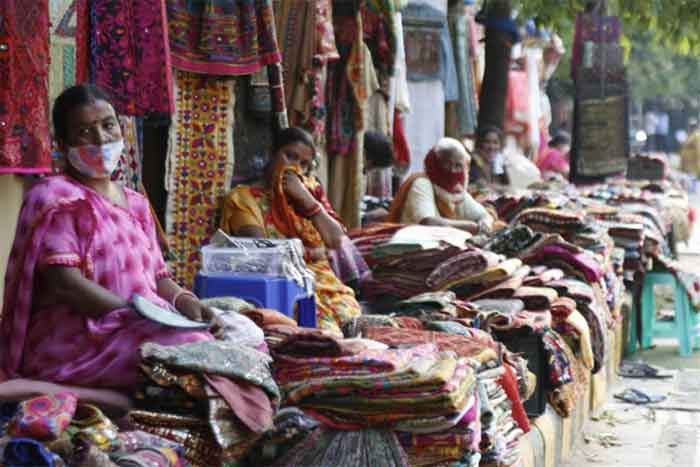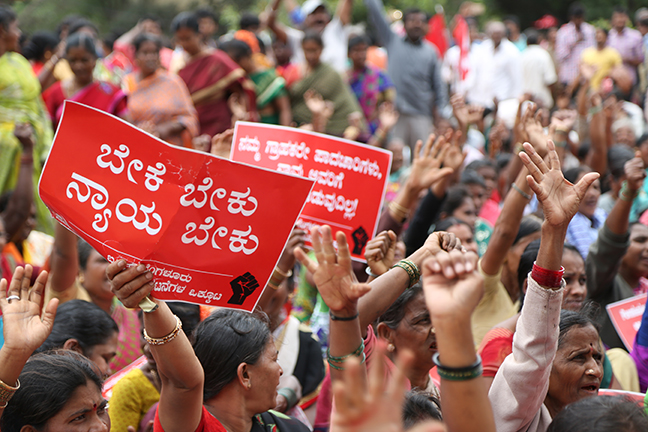
Recent reports of a training program launched by the Punjab Government for street vendors are welcome. This training increases the capacity of vendors to provide safe food. This training has been linked also to institutions of community health and the experience of initial training programs conducted have been encouraging.
Earlier training programs conducted by the National Association for Street Vendors of India in Jharkhand and Bihar to train street vendors for observing Covid protocols while carrying out their livelihood activities were also found to be very useful for them. Alongside the training vendors also provided masks, gloves and sanitizers.
These training programs can be helpful for vendors in returning to their work with more confidence. Street vendors in India have faced a lot of problems even in normal times. They had to contend with several hostile authorities at the same time and pay bribes to continue their livelihood activities. There have been evictions and seizures of their goods and equipment from time to time. Minimal facilities were created for them and they were exposed to the vagaries of extreme weather in the course of their work. Due to neglect of their essential facilities their capacity to provide good service was also affected adversely, but despite adverse conditions they made a very important contribution to providing cheaper goods and services, including food, to a large number of people. It is true that some of them may have behaved in less than responsible ways and encroached area best left for pedestrians and traffic, but on the whole they made a good contribution to economy and society, but such a recognition was not reflected in the often hostile policy of the authorities.
Bigger business interests have been generally hostile to street vendors getting a significant share of the market and this is also reflected in government policy. In addition to their worksite harassment, many of them have faced evictions and demolitions in their dwelling places as well and once they are forced to move to outskirts of cities, it becomes difficult to continue their livelihood as well.
Despite difficulties and problems by sheer hard work and resilience vendors created an important place for themselves on streets, in special designated areas, in regular markets , as vendors moving from door , or entrenched in special places like bus stations and even in moving trains. Thanks to the growing strength of their organization and some sympathy in government circles, important national level legislation to protect their interests was enacted by the previous UPA government, although its implementation in the right spirit all over the country is still awaited.
Street and transport sector vendors faced a most difficult life during the recent lockdowns when their livelihood just vanished for prolonged periods. They tried their best to come back after lockdowns but various restrictions continued. While this sector was going through very difficult times, a strange development was noticed. Some of those in better employments or even regular jobs who had lost these during lockdown were now seen to be entering this sector despite the difficult sitution as they had nowhere else to go. This also testifies to the value of this informal sector as an employment of last resort.
It must be understood, above all by the government, municipal authorities and the police, that vendors are now in the process making a comeback after passing through a period of great difficulties. This is a source of employment for a very large number of people. Hence helpful conditions must be created for their safe and satisfactory livelihoods and to ensure this, governments must work in cooperation with those organizations of vendors which have a reputation for good and sincere work. Some governments have transferred a little cash to vendors. This is a step in the right direction, but often the cash transferred is so small that this by itself will not provide much relief to those whose livelihood and income were affected so adversely. Much more is needed.
Street vendors have been generally looked at only in the urban context, but of course they also have a presence in rural areas as well. I recently happened to visit a rural hamlet in Bundelkhand which consists almost entirely of landless , low income households from kuchbandia community who take cloth or other goods from merchants on credit and roam from village to village trying to sell this. They took to this work after their traditional livelihoods collapsed in the changing world. However during covid and lockdown phase this relatively new livelihood also collapsed. Organizations of vendors as well as governments should also look at the needs of these neglected and scattered segments of vendors, and not just those who are concentrated in the bigger cities.
Bharat Dogra is a journalist and author. His recent books include Man Over Machine and Earth Without Boundaries.
GET COUNTERCURRENTS DAILY NEWSLETTER STRAIGHT TO YOUR INBOX













































